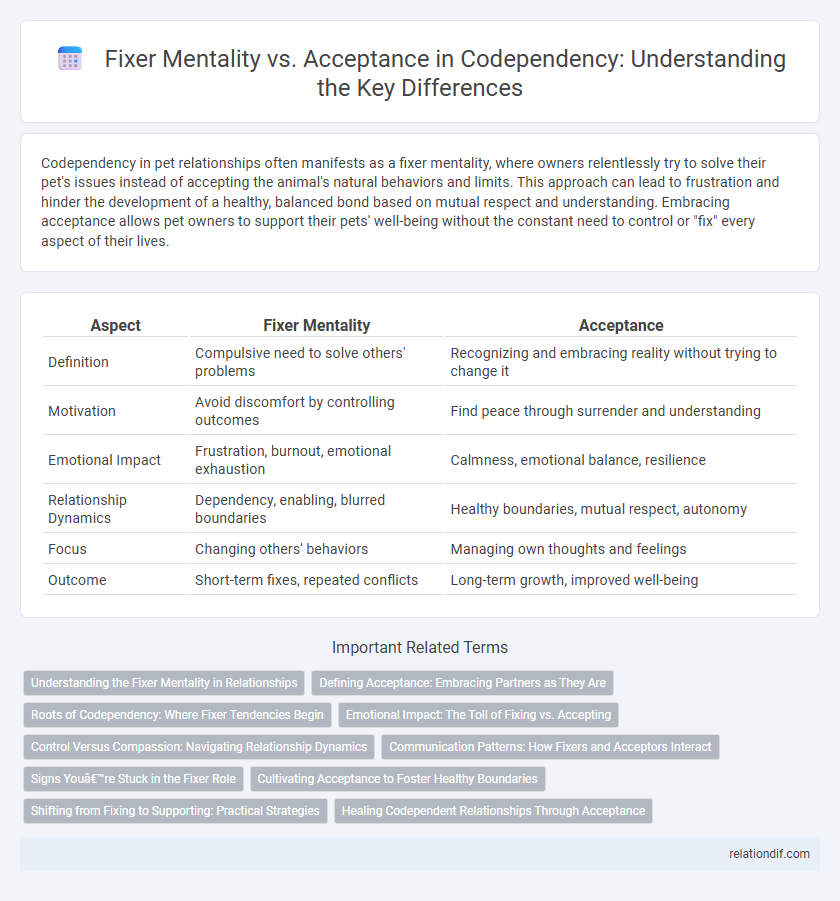Codependency in pet relationships often manifests as a fixer mentality, where owners relentlessly try to solve their pet's issues instead of accepting the animal's natural behaviors and limits. This approach can lead to frustration and hinder the development of a healthy, balanced bond based on mutual respect and understanding. Embracing acceptance allows pet owners to support their pets' well-being without the constant need to control or "fix" every aspect of their lives.
Table of Comparison
| Aspect | Fixer Mentality | Acceptance |
|---|---|---|
| Definition | Compulsive need to solve others' problems | Recognizing and embracing reality without trying to change it |
| Motivation | Avoid discomfort by controlling outcomes | Find peace through surrender and understanding |
| Emotional Impact | Frustration, burnout, emotional exhaustion | Calmness, emotional balance, resilience |
| Relationship Dynamics | Dependency, enabling, blurred boundaries | Healthy boundaries, mutual respect, autonomy |
| Focus | Changing others' behaviors | Managing own thoughts and feelings |
| Outcome | Short-term fixes, repeated conflicts | Long-term growth, improved well-being |
Understanding the Fixer Mentality in Relationships
The fixer mentality in codependent relationships manifests as an overwhelming need to solve others' problems, often leading to neglect of personal boundaries and emotional health. Understanding this mindset reveals how it masks deeper fears of abandonment and low self-worth, driving individuals to seek validation through control and caretaking. Embracing acceptance allows healthier relational dynamics by fostering empathy without enabling dependency or sacrificing self-respect.
Defining Acceptance: Embracing Partners as They Are
Acceptance in codependency involves recognizing and embracing partners as they truly are, without attempting to change or fix them. This contrasts with the fixer mentality, which drives individuals to solve their partner's problems or control outcomes. Embracing acceptance fosters healthier relationships by promoting respect for personal boundaries and encouraging emotional independence.
Roots of Codependency: Where Fixer Tendencies Begin
Fixer mentality in codependency often stems from childhood environments where love was conditional and emotional needs were unmet, leading to an ingrained belief that worth is tied to helping or "fixing" others. This mindset drives individuals to control or solve others' problems as a way to gain approval and avoid abandonment. Cultivating acceptance involves recognizing these roots, setting healthy boundaries, and acknowledging that true connection does not require fixing others.
Emotional Impact: The Toll of Fixing vs. Accepting
The emotional toll of a fixer mentality often manifests as chronic stress, burnout, and resentment due to constant efforts to control others' problems. Acceptance, in contrast, fosters emotional resilience and peace by embracing situations and boundaries without the need to change or "fix" them. Research reveals that acceptance-based approaches significantly reduce anxiety and depression symptoms linked to codependency.
Control Versus Compassion: Navigating Relationship Dynamics
Fixer mentality often drives individuals to control others' problems, leading to strained relationships and emotional exhaustion. Embracing acceptance fosters compassion, allowing space for others to grow authentically without the pressure of constant intervention. Balancing control with empathy transforms relationship dynamics, promoting healthier boundaries and mutual understanding.
Communication Patterns: How Fixers and Acceptors Interact
Fixers often dominate conversations with problem-solving strategies, while Acceptors prioritize empathetic listening and validation, fostering mutual understanding. Communication patterns in fixers involve offering unsolicited advice and attempting to control outcomes, whereas acceptors create space for emotional expression without judgment. This contrast shapes relational dynamics, influencing trust-building and emotional safety in codependent interactions.
Signs You’re Stuck in the Fixer Role
Constantly attempting to solve others' problems and feeling responsible for their emotions are key signs you're stuck in the fixer role within codependency. Prioritizing others' needs over your own often leads to neglecting personal boundaries and emotional well-being. Recognizing these patterns is essential for shifting towards acceptance and fostering healthier, more balanced relationships.
Cultivating Acceptance to Foster Healthy Boundaries
Cultivating acceptance in relationships shifts focus from a fixer mentality to recognizing personal limits and respecting others' autonomy, which strengthens healthy boundaries. Embracing acceptance reduces enabling behaviors and promotes emotional resilience, allowing both parties to grow independently. Fostering this mindset encourages mutual respect and balanced interdependence essential for long-term relational health.
Shifting from Fixing to Supporting: Practical Strategies
Shifting from fixing to supporting involves recognizing boundaries and fostering autonomy in relationships affected by codependency. Practical strategies include practicing active listening, validating emotions without offering unsolicited solutions, and encouraging self-efficacy in loved ones. Emphasizing acceptance over control promotes healthier dynamics and reduces burnout commonly associated with the fixer mentality.
Healing Codependent Relationships Through Acceptance
Fixer mentality often leads to attempting control over others' problems, reinforcing codependent patterns and emotional exhaustion. Embracing acceptance fosters healthier boundaries by recognizing individual autonomy and limiting self-sacrifice in healing codependent relationships. This shift from control to acceptance encourages emotional resilience and mutual respect, essential elements in breaking codependency cycles.
fixer mentality vs acceptance Infographic

 relationdif.com
relationdif.com